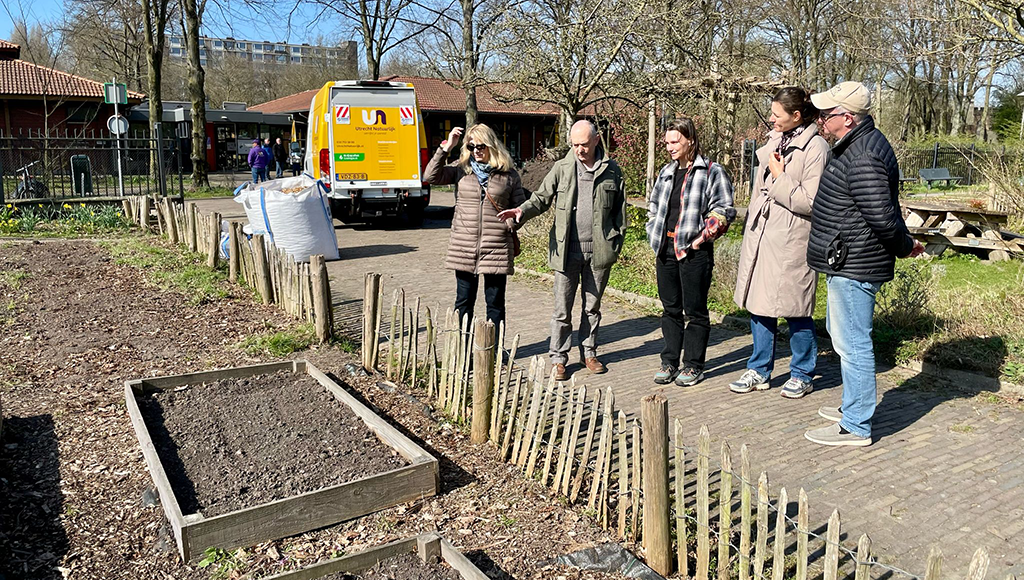On 27 March 2025, I and Mirjam Scholtens (Municipality of Utrecht) took a group of researchers from Lund University for a guided tour of the Utrecht city garden Food For Good and its neighbouring Eilandsteede city farm.
As readers might know, Food For Good is a regular port of call for university groups from across the world and a point of interest for several large international research projects. These include the ESRC funded Circular Society Innovations (that I myself participate in) and the Horizon Europe Research and Innovation Programme funded CULTIVATE. The Foundation’s interest grows out of our investigations into poiesis intensive innovation, Poiesis seen as the poetry of practices, a construction of the elements that go into the process that are non-technical, but rather values, objectives or beliefs.
The Lund researchers (Yulia Voytenko Palgan, Vera Sadovska, Oksana Mont and Andrius Plepys) visited as part of their ‘mobile research lab’ which forms part of their work in CULTIVATE. This is the third group (after Upfarming and ICLEI) from this project to tour the gardens and farm, with Mirjam representing the Municipality of Utrecht (a hub city for the project). A mobile research lab is an innovative research method with roots in ethnography, a collaborative process of conducting in-situ analysis by a research team that allows analysis of a study object – in this case food sharing – in its context.
The group aims to investigate costs, investments, challenges, drivers and success factors for establishing and maintain food sharing initiatives, their visit to Utrecht part of a series of case studies carried out in Barcelona, Milan and Utrecht.
The researchers have already published their case study of Barcelona which is available to download here. In costs and Benefits of Food Sharing in Barcelona, the authors describe the city’s food sharing profile and experience from different perspectives, analyzing general benefits and challenges, risk and associated costs (which include business models and funding sources), while addressing different topics such as growing and composting together, cooking and eating together, food distribution, and municipal and academic perspectives on the approaches followed.
The publication also contains a section on motivation and success factors.
The Barcelona document is quick and easy to read, and offers an overview of the situation in that city. Readers who wish to investigate this experience further should take a look at the authors’ chapter in Understanding the Urban Sharing Economy, another open-access publication edited by Oksana Mont.
In Exploring economic challenges and costs of food-sharing initiatives (and growing out of the Barcelona mobile research lab experience) Sadovska, Mont and Palgan focus on the economic aspects of food sharing with three specific questions: What economic challenges do food-sharing initiatives face? What costs are associated with operating different types of food sharing? What funding sources are available to them, and which actors are important for providing them?
Seven cost categories are outlined: operational, administrative, asset, personnel, communication (and outreach), public relations (and image) and legal compliance, which are further analyzed though their empirical findings. These discussions very much parallel those we promote at the Foundation about poietic practices, skills and governance, as well as those carried out by long-time Foundation friend Cristina Grasseni. In fact, Oksana Mont and Anna Davies of the CULTIVATE project presented alongside Grasseni at the EuroScience Open Forum 2020 at the ERC-invited panel ‘Sharing is caring? Can local practice turn into transformative change in a collaborative economy?’. The cultural analysis of solidarity, diversity, skilling and deskilling, and scale is prevalent throughout Grasseni’s work on food activism, and operationalizes the issue of trust, thematized in both of the publications mentioned above.

















